|
|
|
Sort Order |
|
|
|
Items / Page
|
|
|
|
|
|
|
| Srl | Item |
| 1 |
ID:
131895
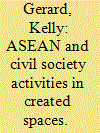

|
|
|
|
|
| Publication |
2014.
|
| Summary/Abstract |
The Association of Southeast Asian Nations (ASEAN) has recently made numerous commitments to engage civil society organizations (CSOs) in its governance practices. However, the opportunities created offer limited means for CSOs to contest policy as a result of strict controls over who can participate and the forms of participation permitted. Activists have consequently pursued their agendas outside of spaces sanctioned by ASEAN through 'created spaces,' such as conferences organized parallel to official summits. However, this form of political participation has limited potential to influence official processes because despite its independence, these activities are still structured in relation to ASEAN practices. The ineffectual nature of CSO advocacy despite ASEAN's people-orientated shift has been documented, however explanations for this trend remain limited. This article applies the modes of political participation framework that acknowledges the role of intergovernmental organizations in structuring spaces for civil society participation and, in doing so, shaping the contribution that CSOs can make. Through an examination of the regulations and practices that govern CSO participation in both ASEAN-sanctioned and independent spaces, it argues that spaces for CSO participation are structured to prevent CSOs from contesting policy, suggesting that ASEAN's shift to widen participation is directed towards legitimating its reform agenda. Hence, ASEAN's claim of becoming 'people oriented' must be considered in recognition of the limiting effect its engagement practices have on CSOs' ability to advance alternative agendas.
|
|
|
|
|
|
|
|
|
|
|
|
|
|
|
|
| 2 |
ID:
170310


|
|
|
|
|
| Summary/Abstract |
Debates on the legitimacy of global governance pay remarkably little attention to whether and how developing countries can influence global governance. Instead, the focus lies significantly on addressing legitimacy challenges such as access and exclusion in global governance. Despite their merits, these debates often stop short of addressing a crucial question: How can weak states harness increased participation in global governance if they are ill-equipped to do so? To respond to this question, this article lays down a framework of mechanisms that might induce more influence by developing countries. The article makes two claims. First, we should understand influence as the combination of two skills: translation of global governance and empowerment to defend the interests of a country at global decision-making processes. Second, increased influence by developing countries must be stimulated by leveraging both domestic capacities (actor-level mechanisms of influence) and resources available at the international system (system-level mechanisms).
|
|
|
|
|
|
|
|
|
|
|
|
|
|
|
|
| 3 |
ID:
184641
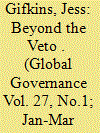

|
|
|
|
|
| Summary/Abstract |
The formal rules governing the UN Security Council offer little insight into how negotiations are conducted on a day-to-day basis. While it is generally assumed that permanent members dominate negotiations, this article investigates avenues for influence for elected members and the UN Secretariat. Institutional power is used to show how permanent members adopt dominant positions in negotiations extending far beyond their Charter-given privileges. Dominance of permanent members is moderated, however, by the legitimacy that support from elected members brings to a resolution. Similarly, the UN Secretariat can use its legitimated authority to influence decisions. The article argues that informal practices are key in understanding how power and influence are allocated in the Council and it forms a building block for future analyses of Security Council practices. This argument also has implications for the perennial reform debates and the prospects for informal reform.
|
|
|
|
|
|
|
|
|
|
|
|
|
|
|
|
| 4 |
ID:
167692
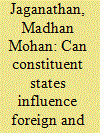

|
|
|
|
|
| Summary/Abstract |
The Indian state has undergone significant transformation since the late 1980s, most notably the extensive decentralisation of power, with consequences for the formation and implementation of Indian foreign policy. This article explores the role of India’s constituent states explaining the extent and limitations of their autonomy and influence. It deploys and extends the state transformation approach to incorporate considerations of issue area and coalition type. Under coalitions led by typical national parties, subnational governments are less likely to influence foreign and security policy. Under the same coalition type, they are more likely to behave autonomously on non-traditional security issues such as sharing of water resources with neighbouring countries. They are less likely to behave autonomously on security issues such as the transnational expression of ethnic solidarity. Under coalitions led by atypical national parties or regional parties, subnational governments are likely to exercise a moderate level of autonomy and influence on issue areas such as transnational expression of ethnic solidarity. They are likely to exercise a high level of autonomy and influence on non-traditional security issues such as sharing of water resources. The framework is illustrated through Tamil Nadu’s activism on Sri Lanka, and West Bengal’s position on water-sharing with Bangladesh.
|
|
|
|
|
|
|
|
|
|
|
|
|
|
|
|
| 5 |
ID:
128993
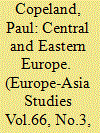

|
|
|
|
|
| Publication |
2014.
|
| Summary/Abstract |
This article analyses the influence and status of the Central and Eastern European states within an enlarged European Union. It analyses two European Union policy negotiations: the Services Directive and the European Union's Financial Crisis Rescue Plan. Central to understanding the influence of a member state within negotiations are its economic size and knowledge of the Brussels policy-making apparatus. Nevertheless, as the new member states from Central and Eastern Europe have gained experience of the European Union policy negotiation process, they remain limited in their ability to influence outcomes. Therefore it can be concluded that while knowledge during negotiations is a necessary condition for successfully influencing outcome, alone it is insufficient because economic weight is particularly pertinent to those outcomes. As a result, the status of the new member states within the European Union is best described as being that of a junior partner, despite the assumed parity of Union membership.
|
|
|
|
|
|
|
|
|
|
|
|
|
|
|
|
| 6 |
ID:
128994
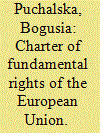

|
|
|
|
|
| Publication |
2014.
|
| Summary/Abstract |
The proclamation of the Charter for Fundamental Rights of the European Union, in December 2000 at Nice, France, followed by its inclusion within the failed Constitutional Treaty and its current status as a legally binding document under the Treaty of Lisbon, charts the changing fortunes of European Union politics dealing with fundamental rights protection. This article outlines the main rationales and hopes behind the enactment of the Charter and notes that through the process of political conditionality it may have been devalued from its very conception. The article suggests that, following their accession, Poland, and later the Czech Republic, used the Charter and Lisbon Treaty negotiations, including their opt-outs from the Charter, to engage in a game of power politics that had both domestic and European undertones. This politics of power game-play reflected a need by both states, and Poland in particular, to respond to both the political conditionality that they had been required to sign up to as part of the accession process and to emphasise how membership had improved their negotiating power. The article suggests that the consequence of this action by both states has not only further devalued the Charter but potentially undermined the rights of Polish and Czech citizens.
|
|
|
|
|
|
|
|
|
|
|
|
|
|
|
|
| 7 |
ID:
187474
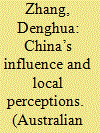

|
|
|
|
|
| Summary/Abstract |
Traditional powers have growing concerns about China’s influence in the Global South derived from its fast-growing outreach in the past two decades. However, how stakeholders in developing countries perceive China’s engagement and influence remains largely unknown. Drawing upon a survey of 210 participants and 30 follow-up interviews in the Pacific region with a focus on Papua New Guinea, Fiji and Tonga, this paper examines Pacific civil society stakeholders’ perceptions about China. It suggests that these perceptions are nuanced at best and reveals concerns about the Belt and Road Initiative, Chinese foreign aid and China-Pacific relations. It argues that China’s influence on Pacific civil society is weak, but this may be different in the political, government and business sectors. More similar research is required to develop a comprehensive understanding.
|
|
|
|
|
|
|
|
|
|
|
|
|
|
|
|
| 8 |
ID:
132868
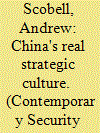

|
|
|
|
|
| Publication |
2014.
|
| Summary/Abstract |
The Great Wall is frequently held up as the most striking symbol of the potency of a persistent Chinese pacifist, non-expansionist, defence-minded strategic stance. But how accurate is this 'Great Wall' depiction of China's strategic culture? What is the impact of this depiction on China and the Asia-Pacific region? While the Great Wall is an apt symbol of a romanticized image of Chinese strategic culture, the reality behind the genesis of this impressive fortification and the accompanying pervasive belief in a monistic strategic tradition is that they are figments of the collective contemporary Chinese imagination. Nevertheless, these formidable myths exert real influence on two 'faces' of strategic culture. The first face refers to how leaders and society perceive the policies and actions of their own country. The second face, routinely neglected, refers to how leaders and society in one state perceive the policies and actions of an adversary or potential adversary state, which, like the first face, is constructed out of myth. The impact of these two faces on the Asia-Pacific region exacerbates the region's security dilemma, adversely impacting China's relations with other countries, notably Japan and the United States.
|
|
|
|
|
|
|
|
|
|
|
|
|
|
|
|
| 9 |
ID:
132046


|
|
|
|
|
| Publication |
2014.
|
| Summary/Abstract |
With rapid China now the world's second-largest economy, the status and Wrole of China's think tanks have become an increasing concern. On the whole, the international status of China' s think tanks is not
commensurate with the country' s current international status. The University of Pennsylvania' s The Global Go To Think Tanks Report published in 2014 said that as of August 2013, China had 426 think tanks, second only to the U.S. with 1,828. But of the top 100 non-U.,S. think tanks in the world only 5 are Chinese, and in the 150 most in?uential global think tanks, only 6 are from China-with the rest mostly from Europe. China' s think tanks lack professionalism and in?uence.' This is why China has been pushing to improve its think tanks internationally. In April 2013, President Xi Jinping proposed building a "new think tank with Chinese characteristics". To date this has been the clearest statement from a leader of China on think tanks? Decision of the CCCPC on Some Major Issues Conceming Comprehensively Deepening the Reform was passed in the 3rd Plenary Session of the 18th CPC Central Committee held in 2013. It clearly proposed"the building of new think tanks with Chinese characteristics and developing
a sound decision-making advisory system". China' s think tanks must make an international transition, but how can they do this'? What specific challenges are there? This paper will analyze these questions.
|
|
|
|
|
|
|
|
|
|
|
|
|
|
|
|
| 10 |
ID:
132779


|
|
|
|
|
| Publication |
2014.
|
| Summary/Abstract |
Simultaneous rapid rise in both the world oil and agricultural commodity prices have increased interest in determining price transmission from oil prices to those of agricultural commodities. However, although a lot of the empirical research has studied the relation between oil price changes and economic activity, it is surprising that little research has been conducted on the relationship between oil price shocks and the large-size emerging industrial countries agricultural market. Therefore, the main goal of this study is that we are try to use the more detail and new China's weekly data which from 2004/9 to 2012/9 to fill this gap. This study examines the short and long-run interdependence between China fuel oil prices and the average of different kinds of key agricultural commodity prices in China. To this end, the Toda-Yamamoto causality approach and impulse response analysis method are applied to identification of the long and short-run interrelationships. In contrast to lots of the traditional causality analysis indicates that the oil prices and the agricultural commodity prices do not influence each other, our result is mix: we have inferred that the fluctuation of fuel oil price has a short-run effect on the dynamics of agricultural products in China; however, there are no significant in the long-run effects.
|
|
|
|
|
|
|
|
|
|
|
|
|
|
|
|
| 11 |
ID:
169954


|
|
|
|
|
| Summary/Abstract |
China has traditionally had close relations with Central Asia for quite a long time. The main reasons for this are probably their social, cultural, and demographic bonds, as well as geographical proximity, providing China with a different status in Central Asia from those of the other regions in the world. These bonds have also been strengthened by the ancient Silk Road, beginning in China and passing through Central Asia and Iran towards Europe. Cultural relations, in general, and China’s attempt to expand its means of soft power in the region, in particular, have been a significant aspect of the ties between China and the Central Asian countries. It has drawn attention, especially over the recent decade, and has manifested in various forms. By focussing on the dimension of relations between China and the Central Asian countries, this article addresses the question of what does China try to achieve by expanding its soft power in Central Asia? The article argues that China has focussed on the expansion of its soft power and the consolidation of cultural ties with the Central Asian countries to expand its influence in the region and, eventually, to rise as a new centre of power in the international system. Following a conceptual discussion on the definition of soft power, the article analyses the status of soft power in China’s foreign policy and then, the representations of China’s soft power in Central Asia. Finally, the essay discusses the effects of the soft power factor on the expansion of Chinese influence in the region.
|
|
|
|
|
|
|
|
|
|
|
|
|
|
|
|
| 12 |
ID:
134090
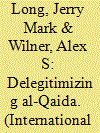

|
|
|
|
|
| Publication |
2014.
|
| Summary/Abstract |
Deterring terrorism is no longer a provocative idea, but missing from the contemporary theoretical investigation is a discussion of how delegitimization might be used to manipulate and shape militant behavior. Delegitimization suggests that states and substate actors can use the religious or ideological rationale that informs terrorist behavior to influence it. In the case of al-Qaida, the organization has carefully elaborated a robust metanarrative that has proved to be remarkably successful as a recruitment tool, in identity formation for adherents, as public apologia and hermeneutic, and as a weapon of war-the so-called media jihad. In the wake of the upheaval of the Arab Spring, al-Qaida and its adherents have redeployed the narrative, promising a new social order to replace the region's anciens régimes. Delegitimization would have the United States and its friends and allies use al-Qaida's own narrative against it by targeting and degrading the ideological motivation that guides support for and participation in terrorism.
|
|
|
|
|
|
|
|
|
|
|
|
|
|
|
|
| 13 |
ID:
101689


|
|
|
|
|
| Publication |
2010.
|
| Summary/Abstract |
In 2002, the USA asked all countries to sign agreements exempting US citizens from prosecution by the International Criminal Court (ICC) and threatened economic sanctions if they refused. Some countries yielded to this pressure even after ratifying the ICC Statute, while others chose to honor their original commitments. Why were some countries more responsive to US influence than others? This article provides an explanation of state vulnerability to attempts of influence through the lens of economic sanctions. Assessing the success of sanctions is difficult because of the selection bias in the instances of the use of such strategies observed by the researcher. Since all countries were asked to sign such agreements, one can observe exactly which signed, whether sanctions were enforced, and how quickly countries responded to such pressure. Arguments about sources of influence - shared interests, economic and security dependence, and domestic politics - are tested using an original dataset collected on country decisions to sign bilateral immunity agreements (BIAs). The authors find support for some existing explanations, including relative power and the relationship of dependency, while previously held beliefs about alliance and security relationships appear to be less influential on decisions to ratify BIAs. These findings have implications for existing research programs on economic sanctions, international organizations, and power politics.
|
|
|
|
|
|
|
|
|
|
|
|
|
|
|
|
| 14 |
ID:
133051


|
|
|
|
|
| Publication |
2014.
|
| Summary/Abstract |
In the Indian context, the Parachute Brigade, being the only formation of its kind available nationally, has performed the dual role of being a strategic reserve tasked for conventional operations, and also that of acting as a rapid reaction force capable of intervention/forced entry in OOAC as was carried out during Op Cactus in the Maldives in 1988. This latter role has subsequently gained in importance due to the nuclearisation of the subcontinent and the substantial reduction in operational battle space that resulted, and also because ot our increasing economic and geo-political clout in the region. Thus, we have created a unique beast, neither Ranger nor Airborne; a potent mix that fulfills both its roles in our area of influence and that has, over the years, met our requirements admirably.
|
|
|
|
|
|
|
|
|
|
|
|
|
|
|
|
| 15 |
ID:
130903
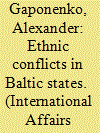

|
|
|
|
|
| Publication |
2014.
|
| Summary/Abstract |
To my mind, the European Union - EU was planned as strictly an economic union and its founder did not plan right from the start to form a single European community of nations or even a European civilization of a higher level.
|
|
|
|
|
|
|
|
|
|
|
|
|
|
|
|
| 16 |
ID:
130998
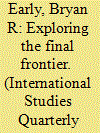

|
|
|
|
|
| Publication |
2014.
|
| Summary/Abstract |
While space capabilities were once concentrated among a handful of leading powers, an increasingly large number of states have gained access to them. As of 2007, 58 countries possessed dedicated civil space programs, 44 countries had placed nationally owned satellites into orbit, and 9 countries had achieved domestic space launch capabilities. To date, however, no systematic inquiries have ever been conducted into which countries acquire space capabilities and why. Within this paper, I develop an explanatory account that explores the capacity-based factors and political motivations that influence countries' acquisition of space capabilities. I test my hypotheses via a quantitative analysis of the factors affecting 143 countries' acquisition of civil space programs, satellite capabilities, and space launch capabilities from 1950 to 2002. My findings shed new light on the primary causes of the proliferation of civil space capabilities and yield a number of important policy implications
|
|
|
|
|
|
|
|
|
|
|
|
|
|
|
|
| 17 |
ID:
133272
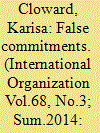

|
|
|
|
|
| Publication |
2014.
|
| Summary/Abstract |
A substantial international relations literature addresses the various ways in which international actors, and the norms they promote, influence state behavior. But less attention has been paid to the influence these actors directly exert at the local level, despite the fact that many transnational campaigns promote norms for which individuals-not states-are the primary transgressors. If individuals behave as some states do, publicly embracing international norms only because they expect a financial or reputational benefit from doing so, then the campaigns have not fully succeeded. But when do individuals engage in real behavior change, and when do they simply change the public image they present to the international community? To begin to address this question, I employ a randomized field experiment to evaluate individuals' willingness to make claims that differ from their true normative commitments. I conducted the experiment in the context of an original 2008 opinion survey about female genital mutilation and early marriage, run in rural Kenya. I find that respondents misrepresent their behavior and intentions, and I supplement these findings with an exploration of causal mechanisms through qualitative interviews.
|
|
|
|
|
|
|
|
|
|
|
|
|
|
|
|
| 18 |
ID:
142221
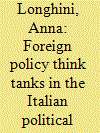

|
|
|
|
|
| Summary/Abstract |
This paper explores the current state of foreign policy think tanks in Italy through an in-depth analysis of its main protagonists. These actors are not always immediately recognizable because the sector is not regulated and little data is publicly accessible. Empirically, the analysis is conducted through a web survey, in-person interviews, and a reputational analysis of seven organizations. This work not only identifies who these actors are and what they do, but it does so taking into account the political context. Such an institutional argument suggests that foreign policy think tank ties to the Italian political system are essential. At the same time, those ties pose serious limitations for the evolution of these organizations, especially in a transnational perspective.
|
|
|
|
|
|
|
|
|
|
|
|
|
|
|
|
| 19 |
ID:
133274
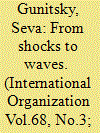

|
|
|
|
|
| Publication |
2014.
|
| Summary/Abstract |
What causes democratic waves? This article puts forward a theory of institutional waves that focuses on the effects of systemic transformations. It argues that abrupt shifts in the distribution of power among leading states create unique and powerful incentives for sweeping domestic reforms. A variety of statistical tests reveals strong support for the idea that shifts in hegemonic power have shaped waves of democracy, fascism, and communism in the twentieth century, independent of domestic factors or horizontal diffusion. These "hegemonic shocks" produce windows of opportunity for external regime imposition, enable rising powers to rapidly expand networks of trade and patronage, and inspire imitators by credibly revealing hidden information about relative regime effectiveness to foreign audiences. I outline these mechanisms of coercion, influence, and emulation that connect shocks to waves, empirically test their relationship, and illustrate the theory with two case studies-the wave of democratic transitions after World War I, and the fascist wave of the late interwar period. In sum, democracy in the twentieth century cannot be fully understood without examining the effects of hegemonic shocks
|
|
|
|
|
|
|
|
|
|
|
|
|
|
|
|
| 20 |
ID:
088030
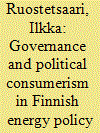

|
|
|
|
|
| Publication |
2009.
|
| Summary/Abstract |
The research task in the study was, firstly, to analyse citizens' perceptions of the power structure underlying Finnish energy policy-making. Secondly, we analysed the role of civil society in the energy sector, addressing the question whether Finns feel that they can influence energy policy-making as citizens through general elections (civic participation) or as consumers via their own consumption choices (political consumerism). Methodologically, the study was based on postal survey conducted in 2007 among a random sample representing 18-75-year-old Finns (N=4000). According to the views expressed, the innermost core of the influence structure of Finland's energy policy-making today comprises only the Cabinet and Parliament, while the second circle is composed of energy-producer firms and big firms. The European Union, the Ministry of the Environment and the Ministry of Trade and Industry belong to the third circle of influence. The power relations in Finland's energy sector have continued particularly stable since the late 1980s despite the liberalization and globalization of the energy markets. In order to influence energy policy-making, citizens consider their own consumption choices more useful than voting in elections or contacts with MPs, authorities and energy-producing companies. The least useful devices are radical environmental activism and participation in mass demonstrations.
|
|
|
|
|
|
|
|
|
|
|
|
|
|
|
|
|
|
|
|
|